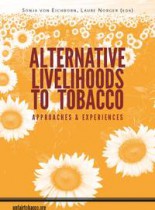
Die Studie Alternative Livelihoods to Tobacco. Approaches & Experiences bietet einen Einblick in bestehende Initiativen und Ansätze zu Alternativen. Autor_innen aus Brasilien, Kenia und Bangladesch stellen ihre jeweiligen Projekte dar. Auf dieser Grundlage diskutieren die Herausgeberinnen einige Problemfelder im Prozess des Ausstiegs aus dem Tabakanbau und formulieren Empfehlungen.
„Es ist ein Mythos, dass Tabak eine Cash Crop ohne Alternative sei“, sagt Sonja von Eichborn, Projektkoordinatorin von Unfairtobacco.org, „Alternativen sind möglich und können die Lebensbedingungen der ehemaligen Tabakbauern und -bäuerinnen verbessern. Dabei sind zwei Punkte, die wir in der Studie empfehlen, besonders wichtig: 1. Während des gesamten Prozesses zum Ausstieg müssen die Bauern und Bäuerinnen in die Entscheidungen einbezogen werden, und 2. Der Ersatz durch eine andere reine Cash Crop in Monokultur kann nicht Ziel des Ausstiegs sein.“
Eine deutschsprachige Version der Studie ist als Webpublikation erscheinen.
http://www.unfairtobacco.org/alternativen/alt-studie/
Inhalt
1. Introduction
2. Efforts to Date: an Insight
2.1. Government Supported Actions
2.2. Civil-society Led Initiatives
3. Three Different Approaches
3.1. Brazil: Diversification of Production and Income in Areas of Tobacco Cultivation
3.2. Kenya: Tobacco to Bamboo
3.3. Bangladesh: No Tobacco, grow Food!
4. Mere Substitution, Holistic Approach or Economic Interest?
4.1. At the Grassroot Level
4.2. Government Backing
4.3. Institutions for Tobacco Production
4.4. Tobacco Industry’s Interest
4.5. Civil Society Organisations’ Support
5. Conclusions and Recommendations
6. Sources list of Abreviations
Impressum
This project is partly funded by the European Union.
DISCLAIMER: This publication has been produced with the assistance of the European Union.
The contents of this publication are the sole responsibility of publishing organisations and can in no
way be taken to reflect the views of the European Union. This publication is published within the
framework of the EU funded project „Put MDG1 back on track: supporting small scale farmers, safety
nets and stable markets to achieve food security“. Partners in the project are: Glopolis (CZ), FDCL (DE),
SOS Faim Belgium und SOS Faim Luxembourg.
With financial support of the Federal Ministry for Economic Cooperation and Development, Germany
and with kind support of the LEZ Berlin.
The authors are solely responsible for the content.


